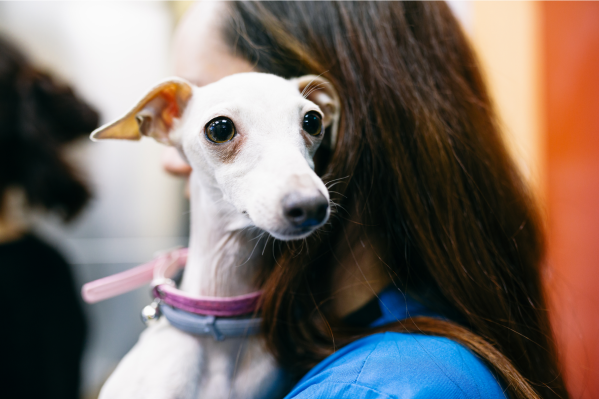Pet parents already know: Dogs can suffer from anxiety for many reasons, and some experience it chronically.
If your dog doesn’t experience the issue, you’ve definitely seen a dog with anxiety at the dog park or heard about it from one of your doggie parent friends.
But what could it mean if anxiety comes on suddenly? Some pet parents notice seemingly random anxiety in their adult dogs with little to no explanation.
Although there are ways to manage sudden onset anxiety in dogs, Dr. Yui Shapard, BVM&S, MRCVS and medical director at Pawp, says learning how to prevent anxiety in the first place is the best way to care for your dog. It’s also important to remember there’s no one-size-fits all way to manage anxiety in your pet.
“Anxiety is a word that can vary in meaning depending on the person using it,” explains Dr. Shapard. “An owner may notice their dog acting restless as a display of ‘anxiety,’ but another owner may recognize this as ‘distress’ from a medical cause.”
Read on to learn what to do if you suspect your dog has anxiety and how to prevent and manage it.
Reasons why your dog is anxious all of a sudden
There are a few causes for sudden anxiety in dogs, and it can depend on age, breed, fears, and in some cases, medical issues.
Age
"The first sign of age-related anxiety can be as early as 6 months old,” says Dr. Shapard.
Younger dogs and puppies may experience anxiety as they get used to a new environment and learn how to behave in the world. It's also not uncommon for anxiety to crop up in older dogs as they start experiencing changes in eyesight, hearing, and their sense of smell. Senior pups can also experience cognitive changes which may also lead to anxiety.
Fear or frustration
According to Dr. Shapard, a traumatic event can also trigger sudden anxiety in a dog.
“Dogs who have experienced abuse, for example, can certainly develop anxiety in different forms. Even something that appears benign like a change in environment can cause anxiety for more sensitive dog breeds,” says Dr. Shapard. Although all dogs can experience anxiety, breeds like schnauzers, sheepdogs, and wheaten terriers are more prone to anxiety than other breeds.
Certain frustrations can also manifest or appear as anxiety in dogs who have never experienced anxiety before.
“Intact male dogs can also develop anxiety when they are isolated from other female dogs,” explains Dr. Shapard. “A medical investigation is crucial to make sure we are not misdiagnosing a medical cause for a behavior cause.”
Separation
During the pandemic, many pet parents were staying home and spending more time with their furry friends than ever. Once their humans returned to work and regular lives outside the home, many pups were left feeling stress and separation anxiety. Any change up in routine like this could cause sudden anxiety in dogs.
Medical issues
“There are so many conditions that can cause change in behavior that may manifest as anxiety, so it can be hard to narrow this down,” explains Dr. Shapard. “Some of the more common causes of change in behavior that may look like anxiety found in practice are: Endocrine disorders, or skin issues such as dermatitis or ectoparasitic infestation (fleas or mites) that can cause generalized itching and discomfort, musculoskeletal injury, GI disorders such as pancreatitis, renal or hepatic disease, urinary issues such as UTI or bladder stones, or neurologic disease,” she says.
Signs of sudden anxiety in dogs
Dr. Shapard points out a few telltale signs your dog might be experiencing anxiety. If you notice any of the below changed/new behaviors, you should seek guidance from a vet.
Panting excessively
Yawning
Change in appetite
Destructive behavior, e.g. tearing up pillows, knocking over chairs, etc.
House soiling
Whining/vocalization
Salivation
Aggressive behavior such as biting, lunging, snarling
Escaping
Isolating themself/not socializing
Stress-induced diarrhea
Restlessness/pacing
What to do if your dog is experiencing sudden anxiety
Unfortunately, just like in people, there’s no hard and fast rule to manage anxiety. If you’re concerned about anxiety coming up in the future, Dr. Shapard says there are a few things you can do to help prevent anxiety. Of course, these aren’t guarantees, but they’re good rules to care for your dog to help them live a healthier life.
For example, with separation anxiety, “Training your dog to become more independent as well as providing ample environmental enrichment is important,” says Dr. Shapard. “Socialization from a young age is also crucial for their ability to adjust to new people, new animals, and new environments, and this should start as early as possible, but after the puppy vaccine series has started since we also want to avoid exposing puppies to various pathogens.”
There are a few home remedies for anxiety you can try if it’s confirmed by your vet that anxiety is present, such as Adaptil, which can be used as a diffuser that can be worn around the dog’s neck in a collar or as a plug-in diffuse that can be used for at-home anxiety behavior.
Dr. Shapard notes that it’s important to remember that anxiety can be passed down from human to dog.
“Anxious owners would not only benefit themselves but their own dogs by seeking professional mental health care,” she says.
If your dog is experiencing anxiety, Pawp offers on-demand pet telehealth, with vets available 24/7 to help answer all your questions about sudden anxiety in dogs.

Reviewed and fact-checked by
Yui Shapard, BVM&S, MRCVS and Medical Director at Pawp
